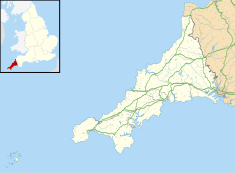Trewithen House is a Georgian country house in Probus, Cornwall, England. The Palladian house was built by London-based architect Thomas Edwards in 1723. The house is listed Grade I on the National Heritage List for England, and its gardens are Grade II* listed on the Register of Historic Parks and Gardens.[1][2]
| Trewithen House | |
|---|---|
 Western façade | |
| Location | Probus, Cornwall, England |
| Coordinates | 50°17′26″N 4°55′52″W / 50.29058°N 4.93118°W |
| Built | 1723 |
| Architect | Thomas Edwards |
Listed Building – Grade I | |
| Official name | Trewithen House |
| Designated | 20 February 1956 |
| Reference no. | 1141100 |
| Official name | Trewithen |
| Designated | 11 June 1987 |
| Reference no. | 1000510 |
History
editWealthy landowner and lawyer Phillip Hawkins purchased the estate in 1715. He ordered London-based architect Thomas Edwards[3] to build the Palladian house in 1723. It was later revised by Edwards in around 1738 and by Sir Robert Taylor in the 1750-1760s.[1]
Architecture
editThe house is built from granite ashlar, Pentewan stone ashlar and stucco, and features hipped slate roofs and rendered stacks. The central doorcase is arched with a pulvinated frieze, and contains an 18th-century central panelled door with sidelights.[1]
In the interior, the central east room of the house is panelled with pine wood, while the central south room features arcaded screens and Roman-style Ionic entablatures, with rococo arabesques adorning the fireplace wall. The main staircase of Trewithen House is cantilevered, and set in a semi circular open well.[1]
Grounds
editThe grounds of Trewithen Estate are noteworthy, with a prominent 200 yard-long lawn and gardens containing some rare plants.[4] The two garden pavilions located 15 meters to the north east and the north west of the house are Grade I listed.[5][6]
The entrance gates and piers 500 meters to the north east and the north west of the house are Grade II listed,[7][8] as are the gates with piers to the north east and north west of the house.[9][10][11] The kitchen garden walls adjoining the service wing to the west of the house are Grade II listed.[12]
References
edit- ^ a b c d Historic England, "Trewithen (1000510)", National Heritage List for England, retrieved 2 December 2016
- ^ Historic England, "Trewithen House (1141100)", National Heritage List for England, retrieved 2 December 2016
- ^ "History of the Trewithen Estate". Trewithengardens.co.uk. Retrieved 8 September 2016.
- ^ "Trewithen". Historic Houses Association. Retrieved 8 September 2016.
- ^ Historic England, "Pavilion approximately 15 meters North East of Trewithen House (1160827)", National Heritage List for England, retrieved 2 December 2016
- ^ Historic England, "Pavilion approx 15 meters North West of Trewithen House (1328913)", National Heritage List for England, retrieved 2 December 2016
- ^ Historic England, "Entrance gate and piers approximately 500 meters North West of Trewithen House (1252449)", National Heritage List for England, retrieved 5 October 2017
- ^ Historic England, "Entrance gate and piers approximately 500 meters North East of Trewithen House (1141103)", National Heritage List for England, retrieved 5 October 2017
- ^ Historic England, "Gate with piers approximately 100 meters North East of Trewithen House (1160839)", National Heritage List for England, retrieved 5 October 2017
- ^ Historic England, "Gate with piers approximately 300 meters North West of Trewithen House (1160865)", National Heritage List for England, retrieved 5 October 2017
- ^ Historic England, "Gate with piers approximately 110 meters North East of Trewithen House (1141102)", National Heritage List for England, retrieved 5 October 2017
- ^ Historic England, "Kitchen garden walls adjoining service wing to West of Trewithen House (1160837)", National Heritage List for England, retrieved 5 October 2017
